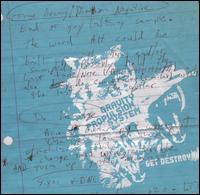This might just be the most aptly named record I've heard in quite some time now. Get Destroy is the name of that record, delivered to us by the Sonic Youth-inspired Gravity Propulsion System, only System are even more loud at times than their predecessors.
Low on the vocals, heavy on the feedback, the trio of Bryan Baxter, Mark Owen, and Lance Pellegrini proceed to bend sound and create new noises for over half an hour, really stretching the mind on what's really acceptable as a song. They might not be quite as adventurous as their inspiration, but they sure as hell follow on the same set of tracks. The squalls of guitar and maelstrom of noise are awash in waves upon waves of reverb, sounding like ungodly things are being done to the guitar.
There are no conventions followed whatsoever, no rules of what's acceptable and what should and shouldn't be done, just a complete, unbridled, free-form mess. No song illustrates this in a brighter light than the thirteen-minute album closer, "Time Decay." The first two minutes or so consists of jagged rhythms and disjointed shouted vocal delivery, all over the fuzz-laden heavy distortion in the background. The vocals are loud, but tuned down in comparison with the guitar, drum, and bass, which are all firing with reckless abandon. After that two-minute mark is when things really start to become interesting.
Led in by a thick, chunky bass-line and that continuous reverb, the guitar comes into a limited role to start with, eventually rejoined by some very distant sounding vocals, until around the eight-minute mark, where everything breaks loose, and all the instruments just meld together in this noisy, amorphous cluster in which nothing can be differentiated. It's the musical equivalent of mixing every single shade of paint together, only to end up with a uniform gray. The chaotic nonsense works well for the band though, and the sounds and volume only intensify as the duration furthers and the tunings drop, until reaching the frenzied apex at around 11 and a half minutes.
Not every track has quite the entropic feel of the last, but sprinkled throughout you can find all of the elements that made those thirteen minutes so memorable.
I hope Thurston Moore is out somewhere listening, because this record has done him and the rest of his band proud.
